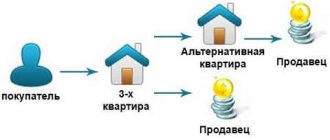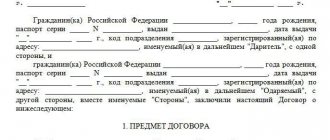A deed of gift for an apartment with an encumbrance has a number of legal nuances, which should be the subject of a separate article. The real estate gift agreement itself is the only gratuitous transaction that does not imply reciprocal obligations. This is one of the convenient and profitable ways to transfer ownership to relatives. A deed of gift for real estate is always in writing and requires mandatory state registration, and the transfer of rights can only be realized during the lifetime of both parties.
What you need to know about the deed of gift with encumbrance
An entire chapter of the Civil Code of the Russian Federation dated January 26, 1996 No. 14-FZ (Part II, Chapter 32, Art. 572-582) is devoted to the issue of donation. The peculiarities of concluding a gift agreement with an encumbrance follow from the articles of the Civil Code of the Russian Federation corresponding to a certain type of restrictions.
To draw up a gift deed with an encumbrance, you will need to collect a package of documents:
- Passports or identity documents of the parties to the transaction:
- If the donee is a minor (under 14 years old) - a birth certificate and documents confirming legal representation.
- If the gift is given to a minor (14-18 years old), his passport and written permission from the parents for the teenager to participate in the transaction.
- If the donee is an incapacitated person, the permission of the guardian or guardianship authority.
- Title documents for the object of donation.
- Consent of the spouse or other owners of the object to the donation, confirmed by a notary.
- Extract from the house register.
- Cadastral passport and documents from the BTI: extract, floor plan.
- Information about the market value of the apartment.
- Application for registration of transfer of ownership rights to a specific object.
- Receipt for payment of the state duty for state registration of the transfer of ownership of real estate. The state duty for individuals is 2,000 rubles (clause 22, article 333.33, chapter 25.3, part II of the Tax Code of the Russian Federation).
- An extract from the Unified State Register of Legal Entities for a transaction with a commercial organization.
When drawing up a deed of gift for a real estate with an encumbrance, it is advisable to obtain legal advice in order to eliminate the risks of invalidation of the agreement if third parties may have claims against the recipient of the gift.
A more reliable way to guarantee the validity of a contract is to get it notarized. The amount of payment for notary services depends on the value of the object and the degree of relationship between the donor and the donee:
- if the parties to the contract are closely related, the payment will be: 3,000 rubles + 0.2% of the contract amount up to 10 million rubles;
- 23,000 rubles + 0.1% of the contract amount over 10 million rubles, but not more than 50 thousand rubles;
- 3000 rubles + 0.4% of the contract amount up to 1 million rubles;
The prices were approved by the Law on Notaries of February 11, 1993 No. 4462-1 (Article 22.1 Chapter 5, Section I).
According to tax legislation, if the donee is a citizen of the Russian Federation and is closely related to the donor, he is exempt from tax. The remaining categories of individuals must pay standard personal income tax: 13% for residents of the Russian Federation and 30% for non-residents.
Personal income tax is calculated from the average market value of the gift or from the amount specified in the contract, provided that its deviation from the average market price does not exceed 20%.
Concept and parties to the gift agreement
The gift agreement is a bilateral civil transaction. Through its conclusion, the authorized party (one of two): transfers free of charge or undertakes to transfer to the other party a thing or property right; releases or undertakes to release the other party from the fulfillment of property obligations in relation to itself or third-party creditors.
For your information
The donation is between
donor and recipient
, which can be either individuals or legal entities.
Multiplicity is possible with respect to each of the contracting parties. For example, residential real estate can be gifted to a married couple and become joint property.
To conclude the transaction in question, the donor and donee must be endowed with the appropriate level of civil capacity.
The ability of legal entities to participate in legal relations of donation is determined by the organizational and legal form and constituent documents; individuals - age, mental development and mental health. The restriction of donation in connection with the last two factors is carried out through the court in the manner prescribed by Chapter. 31 Code of Civil Procedure of the Russian Federation.
According to the rules of Ch. 32 of the Civil Code of the Russian Federation, young children and persons declared legally incompetent cannot act as donors. Persons with limited legal capacity and minors have the right to make expensive gifts (in the understanding of Article 575 of the Civil Code of the Russian Federation, these are things and property rights worth more than 3 thousand rubles) with the permission of parents, guardians/trustees, and guardianship authorities.
In order to guarantee the interests of creditors and the state represented by the tax authorities, Art. 575 of the Civil Code of the Russian Federation prohibits donations between business entities. However, the law does not prohibit them from making donations to public needs or giving gifts to employees.
The Civil Code has established a list of cases when donation is prohibited or limited (Article 575 and Article 576 of the Civil Code of the Russian Federation, respectively). For example, it is impossible to transfer property free of charge in favor of civil servants in connection with the performance of their official functions.
The gift agreement is bilateral. To conclude it, the mutual expression of will of the donor and the donee is required.
Additional conditions and encumbrances can significantly reduce the value of the gift in the eyes of the recipient. Article 573 of the Civil Code of the Russian Federation gave the latter the right to refuse to conclude a gift agreement.
Donation of an apartment with an encumbrance from the point of view of the law
The law provides the owner of a residential premises with the right to dispose of real estate at his own discretion (Article 572 of the Civil Code of the Russian Federation), therefore, even if there is an encumbrance, the owner has the right to donate housing.
The law prohibits such transactions if:
- They are conducted on behalf of the legal representative of the minor or incapacitated owner.
- The recipient is an employee of an educational, medical, social institution, and the donor is a citizen who used their services, a relative or spouse.
- The gift is intended for an official or employee of the Bank of Russia and is related to their professional activities.
- They are concluded between two commercial organizations.
In other cases, the question of whether it is possible to donate an apartment with an encumbrance does not arise.
The procedure for registering a deed of gift with an encumbrance consists of several stages:
- obtaining written permission from the bank to complete a transaction to donate an object;
- drawing up a gift agreement with an encumbrance;
- checking the authenticity of documents and the accuracy of the information contained in them;
- certification of the contract by a notary;
- registration of transfer of ownership.
Depending on the type of encumbrance, the deed of gift will have its own characteristics.
We draw up a deed of gift: when the encumbrance is not a hindrance
A deed of gift allows the owner of a property with an encumbrance to transfer it into ownership to the donee, but with restrictions on his rights.
When agreeing to take ownership of real estate with an encumbrance, you need to weigh the risks, since the donee will be forced to comply with the imposed prohibitions, experiencing certain difficulties, or will be left without a gift altogether if the agreement is declared invalid.
Encumbrances in donation
The law does not stipulate a rule that would establish a direct ban on donating an apartment with an encumbrance. Consequently, this is permitted and has become part of law enforcement practice. At the same time, such agreements are not always interpreted unambiguously by the courts, since there are decisions that differ from each other.
The types of encumbrances are as follows:
1) Physical. In practice, this means that the donor transfers the apartment to the recipient, but at the same time he retains the right to live in it. In other words, it remains registered there. This creates some restrictions on the use of real estate by the new owner. These restrictions are called encumbrances. For example, it will be difficult for a person to sell or rent out an apartment. Usually, when selling such housing, realtors point out this encumbrance, but in this situation the apartment is sold for a very long time and at a significantly reduced price. This option is acceptable for those people acting as donees who are in no hurry to sell their home; they have their own. And they are ready to wait for the time when they can actually feel like a full owner, although legally they are such.
2) Financial: mortgage. Most often, an apartment purchased with borrowed funds from a credit institution acts as collateral. The bank takes it in order to have a guarantee of security of obligations on the part of the borrower. During the loan, which is usually long-term in nature, the owner does not have the right to freely dispose of the apartment without notifying the bank. He cannot sell it or give it away. This is its limitation.
In order to donate such an apartment you need:
- Pay off the mortgage, remove the encumbrance (in some banks this is done automatically after the termination of the financial obligation in the borrower’s personal account, for example, in Sberbank).
- After repaying the debt, you need to remove the encumbrance.
- Only after this should you draw up a deed of gift for housing.
But there is another option. Obtain written consent for the deed of gift from the bank. In this situation, the apartment will still remain pledged to the bank, since the mortgage has not been repaid. That is, the bank reserves the right to seize the residential premises if the borrower refuses to repay the loan.
The bank's consent is required. In any case, when settling a debt, you need to take a certificate from the bank. Otherwise, Rosreestr will refuse to register the transfer of ownership due to the fact that an encumbrance has been placed on the apartment.
3) Arrest. A seizure is imposed on real estate as part of enforcement proceedings. This is a restriction related to the disposal of property. Therefore, if there is a record that the apartment has been seized, it is prohibited to conclude a deed of gift.
To clarify all the circumstances of the case, you need to contact the bailiff who is involved in the specific case. In particular:
- find out the debt for which the seizure was imposed;
- pay off a financial obligation;
- after the arrest is lifted, the bailiff is obliged to submit an application to Rosreestr to terminate the restriction, but this process may take time, or the notification may get lost (this must be controlled);
- receive an extract from the Unified State Register of Real Estate, which does not contain an inscription about the restriction;
- conclude a deed of gift.
If action is not taken in this direction, the arrest will not be lifted. Accordingly, the gift agreement cannot be concluded.
4) Rent. In the process of this encumbrance, a deed of gift may be concluded. But the new owner should not oppress the rights of the tenant until the end of the lease agreement.
5) The donor - the owner of the apartment is a minor. It is necessary to understand that a minor cannot give an apartment as a gift; guardianship will not allow such a transaction.
These are encumbrances placed on the apartment. An agreement for the donation of an apartment with an encumbrance is often confused with an agreement for maintenance with a dependency.
Donation of mortgage housing
Transactions with mortgage real estate are common because they are the most realistic way to purchase an apartment. In the future, the owner of such housing will be able to dispose of it at his own discretion, including as a gift, although legally the owner of the apartment is the credit institution.
All cases of alienation of mortgaged property are under the control of the bank and are possible only with its permission (Article 37, Chapter VI of the Federal Law “On Mortgage” dated July 16, 1998 No. 102-FZ). From the bank’s position, a change of owner represents an additional undesirable risk, therefore such transactions are unattractive for a financial institution, and it has the right to refuse.
There is a greater chance that the bank will at least consider the transaction option for those who, at the stage of obtaining a loan, included in the contract a clause on the right to alienate the apartment in favor of third parties.
When considering donating housing with collateral, the bank carefully assesses its own risks and analyzes the financial condition of the future owner:
- motive for giving: loss of job, illness, moving to another city, etc.;
- the desire of a third party to accept the burden of repaying the loan;
- ability to repay the loan: level and stability of income, balance after making the next payment;
- presence of dependents.
This issue is most often resolved by re-issuing a pledge to another similar object owned by the borrower, or a pledge obligation to the donee.
The listed options for concluding a transaction require the consent of the bank. If it was not possible to obtain it, the donor can draw up a deed of gift with a subsequent obligation to donate it as a gift after repaying the loan, that is, when the property ceases to be the subject of collateral.
Possible risks and consequences
The most important risk is that such a transaction will be considered void . Moreover, any person interested in the case can file a claim.
It is enough for him to involve an experienced lawyer and provide evidence that in fact this is not a donation, but a non-gratuitous transfer . And it won’t be difficult to prove this in case of encumbrance, even with a not very experienced lawyer (Article 166 of the Civil Code of the Russian Federation)
For example, in the case of arrest , this is most likely, because there is a discrepancy in the interpretation of the legislation.
On the one hand, arrest does not deprive the owner of his rights.
On the other hand, transactions with seized square meters are prohibited.
There is little hope for a positive outcome - if this is the only housing . The best thing you can do with real estate seized, for example, for debts, is to repay the debt and then make transactions with it.
mortgages is also ambiguous . To make such a gift, the consent of the bank is required. The only point where you can do without the permission of the creditor is the registration of your children and close relatives (Article 20 of the Civil Code of the Russian Federation).
However, if the agreement states otherwise, it is better not to download the rights, but still apply for permission from the bank management.
To be fair, it must be said that financial organizations do not always agree to such transactions. Changing the creditor is a risk for the bank itself.
As for guardianship , it may very well be that the interests of partially capable or incapacitated people are involved in the transaction. In this case, it is necessary to obtain permission for this procedure from the guardianship and trusteeship authority.
To do this, you need to submit a special application and provide documents for the property. The owner is faced with the task of convincing the guardianship authority that the defenseless ward will not be deceived or even thrown out onto the street.
with a life annuity is easier , but not much. Will the relationship between the former and new owners remain cloudless? And the previous owner will have to endure it, perhaps, for the rest of his life. It is possible that he will even outlive the one whom he made happy with such a gift.
Moreover, no one is canceling taxes. If a gift is intended for a close relative (parents, children, brother, sister, grandparents, spouse), then you don’t have to worry about this.
If the relationship is more distant or it is a stranger, he will have to share 13 percent of the cost of housing with the state.
You can find out about the procedure for donating an apartment to a close relative, in particular how best to draw up a deed of gift, and what documents will be required to complete the transaction on our website. A sample agreement for donating an apartment to a close relative can be downloaded here.
Donation of an apartment with the right of lifelong residence
One of the dangerous moments for the donor is the transfer of ownership of the apartment to the donee. If this is the donor’s only home, he may lose it. This can be avoided by donating an apartment with the encumbrance of lifelong residence. This version of the transaction will become a kind of way to protect the rights of the donor.
If the agreement is drawn up correctly, the rights of the donor and other conditions that do not violate the principle of gratuitousness are spelled out in advance, then it is recognized as legal.
For the donor, a deed of gift with the encumbrance of lifelong residence has obvious advantages, because it allows:
- own and live in a donated apartment for life;
- save registration (registration);
- use utilities for free;
- appeal the transaction and terminate the contract if the recipient violates the terms of the contract.
In order for the donor to acquire the above rights, these conditions must be recorded in the contract down to the smallest detail. In particular, it is worth stipulating what area and premises he has the right to use, mentioning the possibility of third parties living in the apartment, listing the recipient’s obligations for repairing communications, and so on.
The right to live in a donated apartment does not guarantee the donor care and financial support. In addition, the new owner becomes the owner of the apartment and has full right to dispose of it at his own discretion: sell or rent.
However, he will have to take into account the donor’s right to live in the apartment, which he will not lose even if the property is transferred to a third party.
Dependent support
If the homeowner needs care and support, he can enter into a rental agreement. In this case, he transfers ownership of the property to another person, for which he receives a certain amount of money or maintenance in another form. Such a contract is not a deed of gift, because it does not meet the main condition - gratuitousness.
Another difference between a rent agreement and a deed of gift with the right of lifelong maintenance is that the rent payer does not have the right to immediately dispose of the housing, since the apartment becomes his property only after the death of the rent recipient. Before this event, any legal transactions with the property without the consent of the owner are prohibited.
A possible option for evicting the owner is alternative living space.
Since the annuity agreement is concluded on a reimbursable basis, disputes and dissatisfaction often arise between the parties, caused by unfulfilled expectations on the part of the annuity recipient, and unfounded claims or demands on the part of the payer.
To avoid disputes, the cost of the apartment, a detailed list of services and responsibilities, indicating their monthly cost, should be clearly stated.
There are differences between these two types of transactions in taxation: the recipient of a gift under a gift agreement is required to pay 13% personal income tax, and an annuity agreement does not require payment of personal income tax.
As for notarization and state registration, these conditions are necessary only for the rental agreement. The deed of gift does not have to be signed in the presence of a notary.
Another important difference between contracts is the form of ownership. When a gift is made, the property becomes the personal property of the donee, and the property received as a result of an annuity agreement is considered joint property.
Characteristics and types of encumbrance
A gift is a gratuitous transfer of personal property. The process can be conventional or ordinary. One type of procedure is donation. Its difference is that the property becomes the property for public use. In the usual case - for personal use. Residential premises received as a gift are not divided upon divorce. It does not belong to the category of jointly acquired property.
Encumbrance - various forms of restrictions, enshrined in legal documents. It often applies to types of living space. Compliance with the conditions for this action is a mandatory factor. They are divided into three types:
- the donor continues to reside or use the property on a permanent basis;
- the order of use of the encumbered property is distributed between both parties to the transaction;
- the former owner has an unimpeded partial right to own and manage the property.
There are several types of restrictions on encumbrance:
- A mortgage loan is a category of transaction where property is secured by real estate. The agreement will require the bank’s mandatory consent to the procedure. There are options for transferring housing to the receiving party along with loan payments, without them and after repaying the mortgage amount.
- Lease - the right to use and own property begins after the completion of the rental period of the property. A change in the owner of a residential space does not affect the rental agreement. The owner has the right to move into the house or apartment only after the end of the lease term.
- Seizure is a ban on property until the end of the trial. The restriction can only be lifted after the conflict has been resolved.
- Rent - the meaning of the restriction is the lifelong residence of the former owner on the territory of the donated object. He actually becomes a dependent, and his rights are spelled out in the contract. Lifetime residence excludes its full financial maintenance by the new owner of the home. Full ownership of the residential premises occurs upon the death of the donor. The donation of property encumbered with a life annuity directly depends on the consent of the guest (former donor) and the consent of the receiving party. The terms and conditions specified in the previous agreement remain valid.
- An easement is a limited right to use a commercial plot. A category of encumbrance in which the newly-minted owner cannot fully use the entire land plot.
Donation of seized housing
Debt obligations of the homeowner to utility services, banks, and the tax office can lead to the imposition of an encumbrance in the form of seizure of the property. Seizure is imposed only by a court decision and significantly limits the owner’s rights to housing, so it will not be possible to donate an apartment under arrest, at least until the encumbrance is lifted.
Lifting of the arrest also occurs as a result of judicial proceedings in the case of voluntary early execution of the subject of the claim. Sometimes the court may seize an object of similar value and characteristics.
Donation agreement with encumbrance: content and structure
On the one hand, a deed of gift with an encumbrance fits within the framework of an ordinary civil law transaction, but on the other hand, each case is too unique to fit into the framework of a standard agreement.
Depending on the restrictions, a specific sample gift agreement will be required, but the general structure is standard:
- title of the document indicating the type of encumbrance;
- place and date of signing the agreement;
- a header indicating the parties to the agreement: full name, year of birth, full address of residence, passport details;
- data on the subject of the donation with a full description of the object: address, number, floor, number of apartments, cadastral number, cost, certificate from the BTI and other information identifying the object;
- information about property rights and state registration (data from supporting documents);
- the cost of the apartment accepted by the parties;
- presence and type of encumbrances, data of interested parties, restrictions on property rights;
- rights and obligations of the parties;
- conditions for transfer of ownership rights;
- procedure for resolving disputes and other conditions;
- procedure for registration and certification of a transaction;
- personal signatures of the parties.
Sample donation agreement:
Download (DOC, 47KB)
The main difficulty when concluding a gift agreement with an encumbrance lies precisely in the restrictive conditions that can significantly worsen the rights of the new owner. These conditions should be described in detail in the contract.
It is better if the document is drawn up with the assistance of a lawyer or notary, who will check the text for legal literacy and give recommendations and comments.
Certification of the contract by a notary is not a mandatory condition, but registration of rights in Rosreestr at the location of the subject of the transaction in the presence of both parties is mandatory.
The deed of gift is drawn up in at least three copies: for each of the parties and for Rosreestr. In case of notarization, another copy remains with the notary.
Main features and nuances of registering a deed of gift with an encumbrance
When concluding transactions with real estate subject to an encumbrance, the parties need to take into account the key meanings of legislative acts, which did not receive fundamental changes in 2020, which is good news.
You can learn even more about this type of contract from this professional video:
Thus, all the above points remain relevant and the apartment owner does not necessarily need to seek additional clarification from specialists. However, for people who do not have a legal education, when drawing up a deed of gift with an encumbrance, it is better to review these legislative acts or enlist the support of a notary.
Remember that the well-being of your family depends on your decision!
Still have questions after reading the article ? Ask a lawyer and GET A FREE CONSULTATION !








